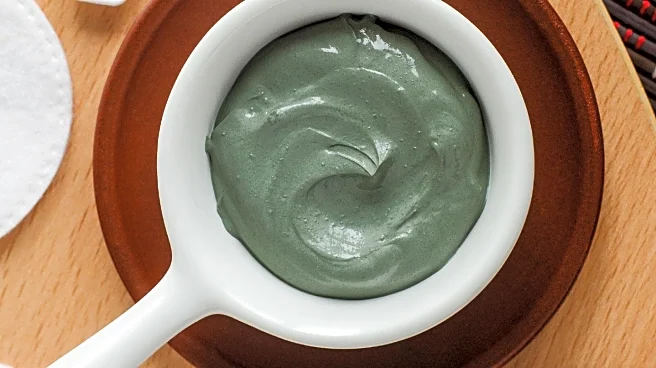What's Happening?
A recent study published in the journal Cosmetics has examined the effects of clay-based face masks on skin oiliness, focusing on red, green, and black clays. Researchers from the University of São Paulo and Lusófona University in Lisbon found that these masks significantly reduce surface oil immediately after use, but the effect is short-lived, with sebum levels rebounding past baseline two hours post-application. The study also noted no improvement in skin firmness or elasticity, challenging claims often associated with clay masks. The research highlights the distinct mineral properties of each clay type, which may inform ingredient selection for specific product goals. However, concerns were raised about heavy metal levels in black clay, which exceeded U.S. FDA limits for arsenic, necessitating further safety studies.
Why It's Important?
The findings are significant for the skincare industry, particularly for brands promoting clay masks as oil-control solutions. While the immediate reduction in oiliness supports the use of clay in rinse-off products, the lack of long-term benefits suggests limited potential for sustained sebum regulation without repeated use. This could impact marketing strategies and product formulations, as brands may need to substantiate anti-aging or firming claims with long-term data. Additionally, the safety concerns regarding heavy metal content in black clay underscore the importance of rigorous testing and compliance verification for mineral ingredients, which could influence sourcing decisions and regulatory compliance.
What's Next?
Further research is warranted to explore the isolated effects of each clay type and their performance in different formulation vehicles. The study suggests that repeated applications or alternative formats may be necessary to achieve long-term benefits. Brands may need to conduct additional testing to ensure compliance with safety standards, particularly concerning heavy metal content. This could lead to reformulations or changes in ingredient sourcing to meet regulatory requirements and consumer safety expectations.
Beyond the Headlines
The study's findings may prompt a reevaluation of consumer expectations regarding clay masks, particularly in terms of their purported anti-aging and firming benefits. As consumers become more informed about the limitations of these products, brands may need to adjust their marketing strategies to emphasize realistic outcomes and the importance of repeated use for sustained effects. The research also highlights the need for transparency in ingredient sourcing and safety testing, which could drive industry-wide changes in formulation practices.










